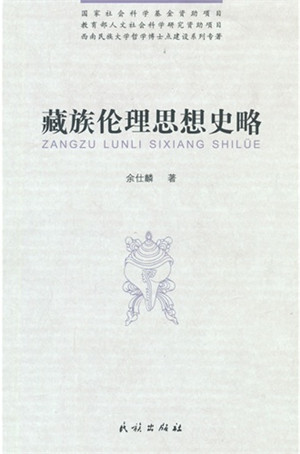Eastern philosophies shaped Tibetan ethics
Author : Yang Hanqing Source : Chinese Social Sciences Today 2016-05-24

A Brief History on Tibetan Ethics
Author: Yu Shilin
Publisher: The Ethnic Publishing House
The Tibetan people, renowned for their distinctive culture, have a long tradition of moral practices and a rich history of ethics. A Brief History on Tibetan Ethics, by Yu Shilin, elaborates on the development of ethics and morality of Tibetans from the pre-historical period to the time of the Tibet Empire (1500 BC- AD 849), the Era of Fragmentation (850-1264), the Sakya authority period (1267-1354) and the Phagmodrupa Dynasty (1354-1641).
Tibetan culture is deeply rooted in the landscape of the Qinghai-Tibet Plateau. Its origins and evolution occurred in distinct phases, across various periods of Tibetan history. The book illustrates the later development of Tibetan Buddhism, when various branches of Buddhism and ethics began to flourish. The evolution of ethics in schools such as Nyingma, Kadam, Sakya, Kagyu, Jonang and Gelug have been examined in mass literature and archives in order to give a full picture of the history of the changing Tibetan ethics and ideology.
Although traditional Tibetan culture is generally exemplified by Tibetan Buddhism, Tibetan ethics have absorbed ideas from Confucianism since the Tang Dynasty (618-907). Confucianism profoundly and constantly affected Tibetan culture and ideology through political, economic, cultural and religious exchanges between Tibet and ancient China. Through marriage and religious interactions with the Han people, the Tibetan community became the “culture capital” of Confucianism on its way to the West. In fact, archaeological evidence shows that the Zhang Zhung kingdom, an ancient civilization predating the culture of Tibetan Buddhism in Tibet, had already engaged in close cultural ties with the Sui Dynasty (581-618).
Yu also investigates the ethics contained in Tibetan traditional literature, medicine, and folktales. Ethics in influential works, including the Epic of King Gesar and The Four Tantras, are analyzed not only from an academic perspective but also according to secular, religious and professional dimensions. Religious ethics of different Buddhism schools and ethics are also examined for a more comprehensive interpretation of Tibetan ethics.
In addition, Yu examines the impact of the Buddhist culture, as well as political, economic and cultural exchanges between Tibetans and other ethnic groups in ancient China on Tibetan ethics. Ethics evolved among various ethnic groups and they affected each other, though each still maintained their own characteristics.
The sociological and historical factors that generated and changed Tibetan ethics are elaborated upon.
Chinese ethnic groups have diverse philosophies and distinctive ethical ideologies that are worthy of investigation. Chinese scholars are now paying increasing attention to research in terms of philosophies of minority groups. The research will provide more resources for national philosophy studies, facilitating national unity and harmony.
Ye Shengtao made Chinese fairy tales from a wilderness
Ye Shengtao (1894–1988) created the first collection of fairy tales in the history of Chinese children’s literature...
-
How northern ethnicities integrated into Chinese nation
2023-09-18
-
Mogao caves
2023-09-12
-
Mogao Grottoes as ‘a place of pilgrimage’
2023-09-12
-
Time-honored architectural traditions in China
2023-08-29
-
Disentangling the civilizational evolution of China
2023-08-28
-
AI ethics in science fiction
2023-08-23














 2011-2013 by www.cssn.cn. All Rights Reserved
2011-2013 by www.cssn.cn. All Rights Reserved